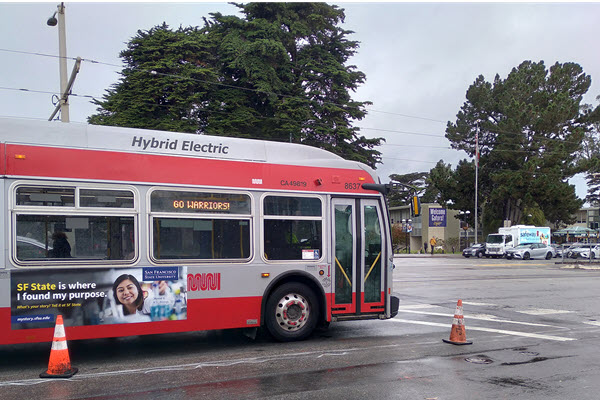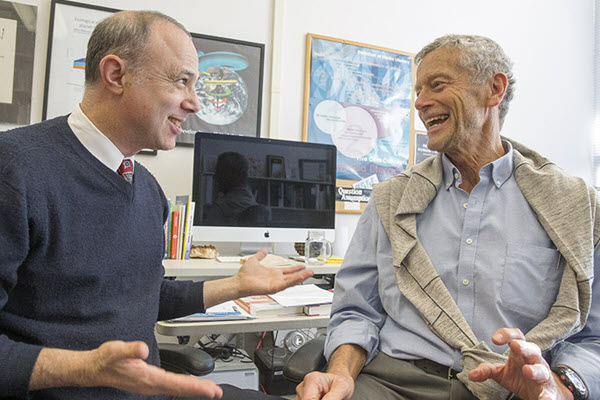News and Announcements

With the rainy season upon us, Environment, Health & Safety offers the top 10 tips on how to drive in the rain.
1. Remain calm if you are hydroplaning
If you notice yourself losing control of your vehicle, stay calm. Do not slam on your brakes, as doing so could cause you to spin out of control. Instead, you should ease your foot off the gas pedal, use a light pumping action on the brake pedal, direct your steering wheel into the path you want your vehicle to go, and wait until you regain traction.
2. Drive slowly
To avoid hydroplaning, do not speed. Take your time and slow down while following the flow of traffic.
3. Make sure your vehicle is in good condition
Ensure your tires, brakes and windshield wipers are functional and responsive.
- Tires: A solid tread and adequate inflation will allow your vehicle to handle the slippery roads.
- Brakes: Drivers are likely to make sudden stops during rainy weather conditions, so checking your brakes and brake fluids occasionally is crucial to ensure they are working well.
- Windshield wipers: Maintaining your windshield wipers will allow you to properly navigate your vehicle without having water streaks obstructing your view of the road.
4. Allow extra space between you and the vehicles nearby
Being too close to another vehicle will give you less time to react to what is ahead. You should leave plenty of room in front of you to ensure enough space to act quickly to avoid getting into an accident with a vehicle or a foreseeable hazard.
5. Pull over if the rain begins to worsen
If you are having difficulty navigating through the rain, you should pull over to a safe location and wait until conditions improve before heading out on the road again.
6. Do not use cruise control
If you’re using cruise control while speeding in wet weather, it could cause your vehicle to hydroplane. You should avoid using this feature during such conditions to ensure you have full control over your vehicle and can properly regulate the speed at which your vehicle is going.
7. Turn on your headlights
Having your headlights on in the rain will allow you to have better visibility of the road, meaning that you can detect any foreseeable hazards, focus on what the vehicles ahead are doing, or notice when a pedestrian is attempting to cross the street.
8. Keep your windshield wipers on
It is important to keep your windshield wiper on throughout your drive to avoid having water build up and obstruct your visibility of the road.
9. Use your defroster
To prevent your windshield from fogging up during a drive, turn on your front and rear defrosters to maintain a clear view of the road.
10. Avoid driving through large puddles
Heavy rainfall can create large puddles. Generally, six inches of water could cause a vehicle to lose control. So, if you notice a large puddle on a drive, which appears to be half a foot of water or more, you should avoid driving through it. However, if the water seems less than six inches, you should be safe enough to drive over it. When doing so, keep a steady pace. Once you have passed through the puddle, you should test your brakes at low speeds. This will also help dry them off.

On Jan. 17, Asian American Studies Professor Jonathan Lee wrote a column in The Pioneer, a newspaper covering Concord, Clayton and Pleasant Hill. He advocates for gender identity as a human rights issue.
“Because pronouns play a significant role in every aspect of our lived experience, accurate use of pronouns is a core part of being a considerate, kind and empathic person,” Lee wrote. “Using correct pronouns to understand an individual’s gender identity and expression is life-transforming and life-affirming. It is compassionate language.”

Recreation, Parks, Tourism and Holistic Health Professors Erik Peper and Richard Harvey contributed an article to Townsend Letter on Jan. 13. The article is titled “Are food companies responsible for the epidemic in diabetes, cancer, dementia and chronic disease and do their products need to be regulated like tobacco?”
Are you a faculty member interested in the possibility of working with the First-Year Experience (FYE) Peer Mentor Program and having a peer mentor in a spring 2024 course?
Courses eligible to participate
- ENG 114, 106, 202, 209, 210 and other courses that meet the A2 requirement;
- COMM 150 and other courses that meet the A1 requirement;
- PHIL 110 and other courses that meet the A3 requirement; and
- Quantitative Reasoning, B4 requirement
Program goals
Support first-year students in their transition to college by bolstering academic and holistic success strategies by placing a trained peer mentor in classrooms to partner with faculty.
What does a peer mentor do?
- Peer mentors are trained by the faculty director of the FYE.
- Peer mentors are paid student employees.
- Peer mentors attend every class session to help support the students in real time.
- Peer mentors help ease transition to college by creating a strong sense of belonging, both inside and outside the classroom, and helping to navigate how to be an effective college student.
Faculty who participate in the program receive a $500 honorarium.
Learn more on the information sheet via Box.
If you would like to work with a peer mentor or have questions, please email Susanna Jones, FYE faculty director.
Join the Institute for Civic and Community Engagement for an informational session with SF State’s 2023 Panetta congressional intern on Friday, Jan. 26, at noon via Zoom. Ximena Nieves will discuss her Panetta experience and give advice for future nominees.
Do you have an event you’d like to share with the campus community? Or are you looking for something to do on campus? The University Calendar could be your go-to place. There you will find information about student organization events, guest lectures, art and cultural productions, sports schedules and more!
If you have events you would like to share, please submit them via the online form. For questions, please contact the Office of Strategic Marketing and Communications.
SF State Spotlight
Kim Nguyen, peer health leadership coordinator for Health Promotion & Wellness (HPW), along with HPW Director Karen Boyce and their colleagues presented “I Want to Help! Improving Social Connection and Retention through Peer Volunteer Programs” at the NASPA Strategies conference on Jan. 20.
Nguyen established a student volunteer program that took an innovative approach to cultivating students’ desire to connect and help others to address isolation, retention and capacity issues during COVID and budget cuts.
HPW is recruiting volunteer ambassadors for the spring semester. For more information, visit the HPW website.
Recreation, Parks, Tourism and Holistic Health Professor Erik Peper presented “Reducing Tech Stress: How to Optimize Health while Engaging with Technology and Social Media,” on a YouTube webcast on Nov. 30 for the Theosophical Society in America. He provides rationale, background and suggestions how to transform technology-induced stress into technology-boosted health.
Peper’s Jan. 11 post on his blog, Peper Perspective, discusses the benefits of mindfulness-based meditation techniques and explores how similar beneficial outcomes occur with other mind-centered practices.
For the second consecutive year, an EducationWeek study lists Latina/Latino Studies and Race and Resistance Studies Professor Jeffrey Duncan-Andrade among the most influential scholars in the U.S.
Frederick M. Hess, American Enterprise Institute director of education policy studies, creates the annual Edu-Scholar Public Influence Rankings. It spotlights the top 200 education scholars — among over 20,000 nationwide — who move ideas from academic journals into the national conversation.
In an Associated Press story from Jan. 6, Africana Studies Chair and Professor Abul Pitre weighed in on a new law in Florida constraining the teaching of American history at public colleges. The law forbids instruction of theories that “systemic racism, sexism, oppression and privilege are inherent in the institutions of the United States and were created to maintain social, political and economic inequities.”
Pitre says leaders of public colleges who advocate against the new law could face budgetary consequences.
“It requires a certain kind of balance that does not allow them to have too much of an Afrocentric social justice perspective, because they have to go to the same politicians for money who are advocating to eliminate it,” he said.
The Associated Press story has been published in more than 300 media outlets.
Cross country coach Tom Lyon commented to the San Francisco Chronicle about the passing of SF State alumnus Mike Fanelli, a notable distance runner and track and field coach.
Fanelli coached the USA National Team three times, achieving 14 US Olympic Trials Qualifiers and one national championship. He served as the USA Track and Field national cross-country chairman from 1992 to 1994.
“Mike was always willing to talk running and coaching,” Lyon said in the obituary published Dec. 21. “I find myself still using his advice for training, and especially competing, with my athletes.”
Fanelli was inducted into the SF State Athletics Hall of Fame in 2011. The annual Mike Fanelli Track Classic was dedicated in 2019. The Mike Fanelli Scholarship funds supports the Gators men’s cross-country program.